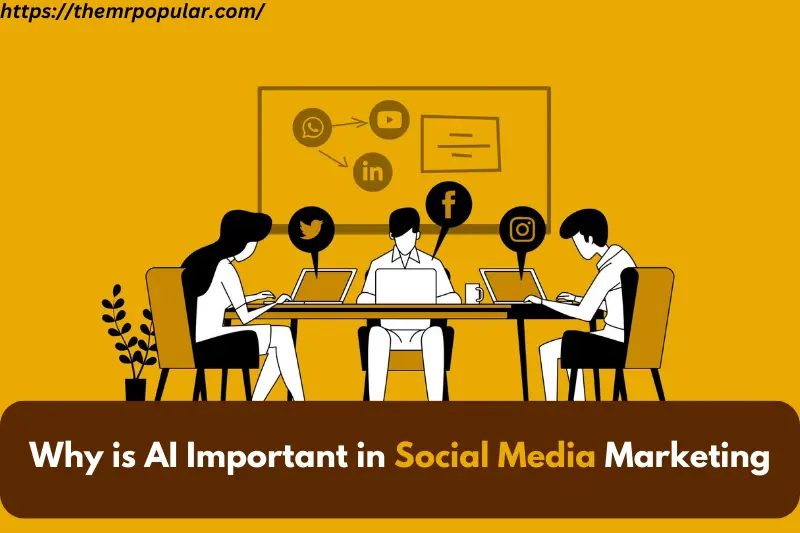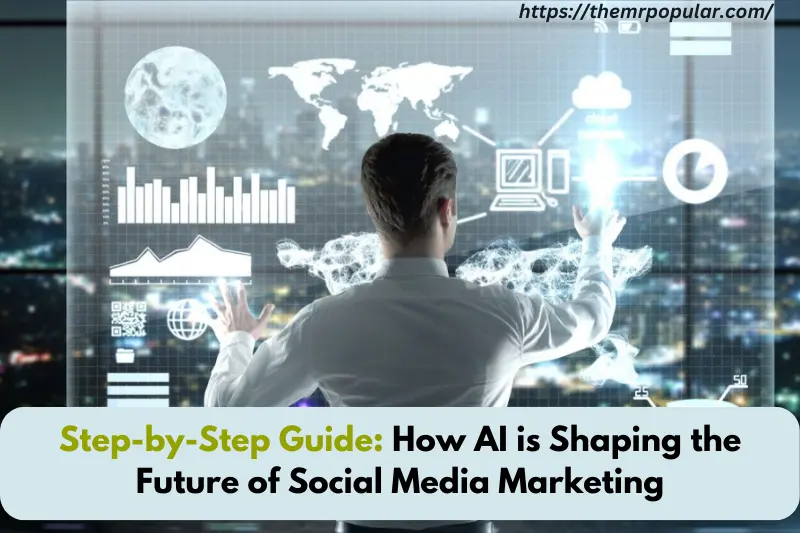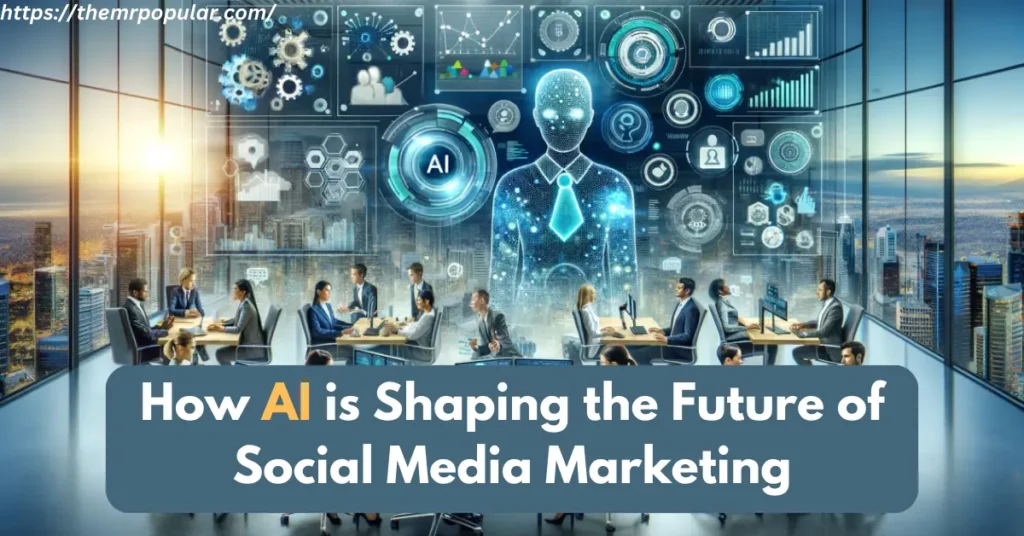Introduction
In today’s digital world, Artificial Intelligence (AI) is rapidly changing how businesses connect with their audience. When it comes to social media marketing, AI is a game-changer. It helps brands understand their customers better, create engaging content, and optimize advertising strategies. With billions of people using platforms like Facebook, Instagram, and Twitter, the importance of effective social media marketing cannot be overstated.
In this article, we’ll explore how AI is shaping the future of social media marketing. From enhancing customer insights to automating content creation and improving customer engagement through chatbots, AI is paving the way for innovative marketing strategies. Whether you’re a seasoned marketer or just starting, understanding the role of AI in social media marketing will equip you with the tools you need to succeed in this fast-paced landscape. Let’s dive in!
How AI is Shaping the Future of Social Media Marketing
Artificial Intelligence (AI) is transforming social media marketing in profound ways. By leveraging advanced algorithms and data analytics, AI provides marketers with valuable insights and tools that were once unimaginable. Here are some key ways AI is shaping the future of social media marketing:
- Data-Driven Insights: AI can analyze vast amounts of user data, helping marketers understand their audience’s behavior, preferences, and trends. This enables brands to create more targeted marketing strategies and deliver personalized content that resonates with users.
- Automated Content Creation: AI tools are capable of generating engaging content, from social media posts to graphics and videos. This not only saves time but also allows brands to maintain a consistent online presence, ensuring that their audience stays engaged.
- Personalization: AI enables brands to deliver tailored experiences to their followers. By analyzing user interactions and preferences, AI can curate personalized content, making users feel valued and increasing the likelihood of engagement.
- Enhanced Customer Engagement: AI-powered chatbots provide real-time support on social media platforms. These intelligent bots can answer questions, resolve issues, and interact with customers, improving overall engagement and satisfaction.
- Ad Optimization: AI plays a crucial role in optimizing social media advertising campaigns. By analyzing performance metrics in real-time, AI can adjust ad placements and targeting, ensuring that marketing budgets are spent effectively.
- Predictive Analytics: AI can forecast trends and consumer behavior, helping marketers anticipate what their audience wants. This proactive approach allows brands to stay ahead of the competition and adapt their strategies accordingly.
- Social Listening: AI tools can monitor conversations and trends across social media platforms. This allows brands to gain insights into public sentiment and respond to emerging trends, keeping them relevant and engaged with their audience.
In summary, AI is revolutionizing social media marketing by providing tools and insights that enhance user engagement, optimize campaigns, and create personalized experiences. As AI technology continues to advance, its influence on social media marketing will only grow, making it essential for marketers to adapt and leverage these innovations.
Why is AI Important in Social Media Marketing

AI is not just a trend; it’s becoming a fundamental component of social media marketing strategies. Understanding its importance can help businesses leverage its potential effectively. Here are several reasons why AI is crucial in the realm of social media marketing:
Improved Efficiency
- Automation of Tasks: AI automates repetitive tasks such as content scheduling, data analysis, and customer inquiries, allowing marketers to focus on strategy and creativity.
- Time-Saving: By streamlining processes, AI helps teams save time and allocate resources more effectively.
Enhanced Customer Experience
- Personalization: AI analyzes user data to provide personalized content and recommendations, improving the overall user experience and increasing engagement.
- 24/7 Customer Support: AI-powered chatbots can provide immediate responses to customer inquiries at any time, enhancing satisfaction and building trust.
Data-Driven Decision Making
- Insightful Analytics: AI processes large volumes of data to uncover trends and insights that inform marketing strategies, enabling more effective decision-making.
- Predictive Capabilities: By forecasting future trends, AI allows marketers to stay ahead of the competition and adapt to changing consumer preferences.
Cost-Effectiveness
- Optimized Advertising Spend: AI enhances ad targeting and optimization, ensuring that marketing budgets are utilized efficiently and effectively.
- Reduced Labor Costs: Automating routine tasks can reduce the need for extensive human resources, leading to cost savings for businesses.
Increased Engagement and Loyalty
- Targeted Campaigns: AI helps create highly targeted marketing campaigns that resonate with specific audience segments, driving higher engagement rates.
- Building Relationships: By personalizing interactions and responding promptly, brands can foster stronger relationships with their audience, leading to increased loyalty.
Staying Relevant in a Competitive Landscape
- Adaptability: AI enables brands to quickly adapt to market changes and evolving consumer behavior, ensuring they remain relevant and competitive.
- Real-Time Insights: Social listening tools powered by AI allow brands to monitor trends and public sentiment, helping them respond proactively to audience needs.
Step-by-Step Guide: How AI is Shaping the Future of Social Media Marketing

AI is transforming social media marketing in innovative ways. This step-by-step guide outlines how businesses can harness the power of AI to enhance their social media marketing strategies.
Understand the Basics of AI in Marketing
- What is AI?: Familiarize yourself with AI concepts, including machine learning, natural language processing, and data analytics.
- Importance in Marketing: Recognize how AI improves efficiency, personalization, and data-driven decision-making in marketing.
Identify AI Tools for Social Media
- Research AI Tools: Explore popular AI tools designed for social media marketing, such as Hootsuite, Sprout Social, and Buffer.
- Evaluate Features: Look for features like analytics, content generation, chatbots, and ad optimization to determine which tools best suit your needs.
Analyze Your Audience
- Gather Data: Use AI tools to collect data on your audience’s preferences, behaviors, and demographics.
- Segment Your Audience: Employ AI algorithms to segment your audience into targeted groups based on their interests and interactions.
Create Personalized Content
- Content Generation: Utilize AI tools to generate engaging and relevant content tailored to your audience segments.
- Content Curation: Leverage AI to curate personalized content recommendations, enhancing user experience and engagement.
Implement AI-Powered Chatbots
- Select a Chatbot Platform: Choose an AI chatbot platform that integrates seamlessly with your social media channels.
- Design Chatbot Conversations: Create scripts for common customer inquiries to improve user engagement and satisfaction.
Optimize Your Advertising Campaigns
- AI-Driven Ad Targeting: Use AI to analyze audience data and optimize ad targeting, ensuring your ads reach the right people.
- Monitor and Adjust: Implement AI tools to track ad performance in real-time and make adjustments as needed to maximize ROI.
Forecast Trends: Use AI algorithms to analyze historical data and predict future trends in your industry.
- Adapt Strategies: Stay proactive by adjusting your marketing strategies based on predictive insights, ensuring you meet evolving audience needs.
Monitor Social Sentiment
- Social Listening Tools: Employ AI-powered social listening tools to monitor conversations around your brand and industry.
- Respond to Feedback: Use insights gained from social listening to respond to customer feedback, trends, and potential issues swiftly.
Continuously Evaluate and Improve
- Regular Analysis: Continuously analyze your social media performance using AI analytics tools.
- Iterate Your Strategy: Use the insights gained to refine your strategies, ensuring ongoing improvement in engagement and effectiveness.
Stay Informed About AI Developments
- Follow Industry Trends: Keep up-to-date with the latest AI advancements and trends in social media marketing.
- Invest in Training: Consider investing in training for your team to ensure they are equipped with the skills needed to leverage AI effectively.
See more posts:
How to Boost Your Instagram Engagement Rate: Complete Guide – The Mr Popular
Facebook Marketing Tips: How to Use Ads for Audience Growth – The Mr Popular
How to Turn Social Media Followers into Paying Customers – Complete Guide – The Mr Popular
Social Media Trends to Watch in 2024 – Complete Detail Guide – The Mr Popular
Advantages and Disadvantages of AI in Social Media Marketing
AI is transforming social media marketing, bringing numerous benefits while also presenting some challenges. Understanding both sides is crucial for businesses looking to leverage AI effectively.
| Advantages |
| Enhanced Efficiency Automation: AI automates repetitive tasks such as content scheduling and data analysis, freeing up time for marketers to focus on strategy and creativity. Real-Time Monitoring: AI tools can monitor social media channels in real time, enabling quick responses to customer inquiries and trends. |
| Improved Customer Insights Data Analysis: AI analyzes vast amounts of data to provide valuable insights into customer behavior, preferences, and trends, helping marketers make informed decisions. Segmentation: Advanced algorithms allow for more precise audience segmentation, enabling tailored marketing strategies that resonate with specific groups. |
| Personalization Tailored Content: AI enables the creation of personalized content based on user preferences, increasing engagement and satisfaction. Customized Recommendations: By understanding user behavior, AI can suggest content that aligns with individual interests, enhancing user experience. |
| Optimized Advertising Targeting: AI helps optimize ad targeting by analyzing data to identify the most relevant audience segments, improving ad performance and ROI. Dynamic Adjustments: AI tools can make real-time adjustments to campaigns based on performance metrics, ensuring efficient use of advertising budgets. |
| 24/7 Customer Support Chatbots: AI-driven chatbots provide immediate responses to customer inquiries, improving engagement and customer service around the clock. Consistency: Automated responses ensure that customers receive consistent information, enhancing trust in the brand. |
| Disadvantages |
| Ethical Concerns Data Privacy: The use of AI in social media marketing raises concerns about data privacy and the ethical implications of collecting and analyzing user data. Bias in Algorithms: AI algorithms may unintentionally perpetuate biases present in the data, leading to unfair targeting or exclusion of certain demographics. |
| Dependence on Technology Over-Reliance: Businesses may become overly dependent on AI tools, potentially neglecting the human element of marketing and customer engagement. Technical Issues: Relying on technology means that any technical failures or glitches could disrupt marketing efforts and customer interactions. |
| Complexity of Implementation Learning Curve: Implementing AI tools can be complex and may require training for staff to use them effectively. Integration Challenges: Integrating AI with existing marketing systems and processes can pose challenges, requiring time and resources. |
| Lack of Creativity Limited Innovation: While AI excels at data analysis and optimization, it may lack the creativity and intuition that human marketers bring to content creation and strategy development. Generic Content: AI-generated content may sometimes lack the personal touch and unique voice that resonate with audiences, leading to less engaging material. |
| Cost of Implementation Initial Investment: The cost of implementing AI tools and technologies can be significant, particularly for small businesses with limited budgets. Ongoing Maintenance: Maintaining and updating AI systems may require ongoing financial and human resources, adding to the overall cost. |
FAQs on How AI is Shaping the Future of Social Media Marketing
What is AI in social media marketing?
AI (Artificial Intelligence) in social media marketing refers to the use of advanced algorithms and data analytics to improve marketing strategies. It helps businesses analyze customer behavior, create personalized content, automate tasks, and optimize advertising campaigns.
How does AI improve customer engagement on social media?
AI improves customer engagement by enabling personalized interactions, such as recommending content based on user preferences. AI-powered chatbots also provide immediate responses to customer inquiries, enhancing communication and building relationships.
Can AI help with content creation?
Yes, AI can assist with content creation by generating social media posts, graphics, and even videos. AI tools can analyze trends and suggest topics that resonate with your audience, making it easier to maintain a consistent and engaging online presence.
What are some benefits of using AI in social media marketing?
Some key benefits include:
Improved efficiency through automation.
Enhanced customer insights for better targeting.
Personalization of content and recommendations.
Optimized advertising campaigns for better ROI.
24/7 customer support via AI-driven chatbots.
Are there any drawbacks to using AI in social media marketing?
Yes, there are some drawbacks, such as ethical concerns about data privacy, the potential for bias in AI algorithms, and the risk of over-reliance on technology. Additionally, implementing AI can be complex and costly for some businesses.
How can I start using AI for my social media marketing?
To start using AI, begin by researching AI tools designed for social media marketing. Identify your audience and gather data to understand their preferences. Then, implement tools for content creation, chatbots for customer support, and analytics for performance tracking.
Is AI replacing human marketers?
While AI enhances many aspects of social media marketing, it is not replacing human marketers. Instead, it complements their work by automating tasks and providing insights, allowing marketers to focus on strategy and creativity.
How does AI help with advertising on social media?
AI helps optimize social media advertising by analyzing user data to identify target audiences, adjusting ad placements in real-time, and predicting which ads will perform best. This leads to more effective campaigns and better use of advertising budgets.
What should I consider before implementing AI in my marketing strategy?
Before implementing AI, consider factors such as your business size and budget, the complexity of the tools, the level of training required for your team, and the ethical implications of using customer data. It’s important to ensure that AI aligns with your overall marketing goals.
Will AI continue to shape social media marketing in the future?
Absolutely! As technology evolves, AI will play an even more significant role in shaping social media marketing strategies. Staying updated on AI advancements will help businesses adapt and remain competitive in the ever-changing digital landscape.
Bonus Points on How AI is Shaping the Future of Social Media Marketing
- Continuous Learning: AI systems improve over time by learning from new data. As more data is collected, AI can refine its algorithms to provide even better insights and recommendations, making your marketing strategies more effective.
- Enhanced Visual Content Creation: AI tools can analyze visual trends and generate images, videos, or graphics tailored to your brand’s style and audience preferences. This can help in creating eye-catching content that captures attention on social media.
- Sentiment Analysis: AI can analyze customer sentiments from social media interactions. This helps brands understand how their audience feels about their products or services, allowing them to adjust their strategies accordingly.
- A/B Testing Optimization: AI can automate A/B testing by quickly analyzing which content or ad versions perform better. This speeds up the optimization process and helps marketers make data-driven decisions faster.
- Improved Crisis Management: AI can monitor social media for potential crises or negative sentiment towards your brand. Early detection allows companies to address issues promptly, protecting their reputation.
- Cost-Effective Solutions: While initial implementation of AI tools may require investment, the long-term savings from improved efficiency, reduced ad spend, and higher ROI can make AI a cost-effective solution for social media marketing.
- Cross-Platform Integration: AI tools can integrate data from multiple social media platforms, providing a holistic view of your marketing efforts. This helps in analyzing performance and adjusting strategies across channels seamlessly.
- Targeting Niche Audiences: AI can help identify and target niche audiences that may be overlooked by traditional marketing methods. This enables businesses to reach specific customer segments with tailored messaging.
- Predictive Customer Behavior: AI can predict customer behaviors based on past interactions, helping brands anticipate needs and tailor their marketing strategies to enhance customer satisfaction.
Scalability: AI technologies are scalable, meaning they can grow with your business. As your marketing needs evolve, AI tools can adapt to handle larger volumes of data and more complex analyses without compromising performance.
Conclusion
In conclusion, AI is revolutionizing social media marketing by making it smarter and more efficient. From personalized content and enhanced customer engagement to optimized advertising and real-time insights, AI offers numerous benefits that can help businesses connect better with their audience.
While there are challenges to consider, the advantages of using AI far outweigh them. By embracing these technologies, brands can stay competitive and succeed in the fast-paced world of social media marketing. As AI continues to evolve, its impact will only grow, making it essential for marketers to adapt and innovate.
